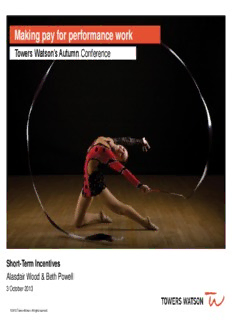
Making pay for performance work PDF
Preview Making pay for performance work
Making pay for performance work Towers Watson’s Autumn Conference Short-Term Incentives Alasdair Wood & Beth Powell 3 October 2013 © 2013 Towers Watson. All rights reserved. Why do short-term incentives exist? To tie people costs to affordability/profits The number of reasons and importance of each To share in business success / foster sense of reason will vary by inclusion company, and even employees group, based To focus employees on specific goals and behaviours on variables such as: To motivate employees to perform better in order to • Company philosophy receive higher pay and values • Employee / union To provide fair levels of pay reflecting an employee’s perspectives individual contributions • Impact of marginal increases in To attract high-performing individuals to the individual effort on organisation business performance And therefore – to be market competitive in terms of structure of pay 2 © 2013 Towers Watson. All rights reserved. Proprietary and Confidential. For Towers Watson and Towers Watson client use only. towerswatson.com The premise behind short-term incentives Increase in Increase in Short-Term Discretionary Business Incentives Effort Results Expectancy Theory An increase in effort will lead to attainment of desired performance which leads to receipt of fair reward that is valued by the recipient 3 © 2013 Towers Watson. All rights reserved. Proprietary and Confidential. For Towers Watson and Towers Watson client use only. towerswatson.com Question for Group Do short-term incentives motivate your employees to perform better? 4 © 2013 Towers Watson. All rights reserved. Proprietary and Confidential. For Towers Watson and Towers Watson client use only. towerswatson.com Why are short-term incentives still important when long-term business success is the key objective? Although most industries operate according to a long-term business strategy, short-term incentives are still critical because: It is easier to set annual targets and objectives than multi-year ones It is easier to measure annual performance than multi-year performance Employees rely on receiving regular payments for personal budgeting purposes The decisions that most employees make most of the time impact business performance within a one-year timeframe (exceptions include executives and planning department) Employees may not be in same position or even with same employer over multi-year period 5 © 2013 Towers Watson. All rights reserved. Proprietary and Confidential. For Towers Watson and Towers Watson client use only. towerswatson.com The latest trends in Short-term Incentives The incentive Profit Individual award pool is the most commonly used payments metric used to determine is typically determined using bonus pay-out levels for tiered financial and non-financial and organisational wide plans, methods for tiered plans, pure are the same for most and individual performance financial results for organisation-wide plans but rating from the Performance organisational wide plans and more differentiated in other Appraisal system for individual for individual incentive plans plan types incentive plans have a budgeted approach using a sum of targets A threshold of performance or a 94% discretionary of companies award of 70% – performance payment in cash and threshold are the two only 8% defer the most common award 80% scenarios of companies only pay someone a bonus if they 0% and represent the 1/3 are in employment on the median percentages date the bonus is paid of target that a low and high performer of companies have 150% typically receive introduced new plans and respectively have the same focus for the coming 2 to 3 years 6 © 2013 Towers Watson. All rights reserved. Proprietary and Confidential. For Towers Watson and Towers Watson client use only. towerswatson.com Design parameters to consider in incentive plans Pay-out Eligibility • Who should be Payout schedule eligible? Deferred • Segmentation Cash/shares Funding Budgeted Performance criteria Financial amounts Non-financial Profit share Group, BU, Funding above individual a minimum return Target setting Payout curve Absolute/relative Link to Time period (LTI) Performance performance levels measurement Calibration Targets Minimum weighting Maximum Additive/ Target multiplicative Quantum Link and weights 7 © 2013 Towers Watson. All rights reserved. Proprietary and Confidential. For Towers Watson and Towers Watson client use only. towerswatson.com Potential combinations Design Decisions Some alternatives Participation Executives Only 1. Executives & Mid-Managers 3 2. All Employees 3. x Performance Criteria Group Sales 1. Group Profit 2. 5 Business Unit financials 3. Milestone achievements 4. x Individual Behaviours 5. Performance Measurement Relative to peers 1. 2 Relative to budget 2. x Links & weights Additive 1. Multiplicative 2. 3 = 6,480 potential Matrix 3. x STI designs! Quantum Market aligned 1. Based on funding pool 3 2. Same for all 3. x Calibration Market aligned 1. Based on funding pool 3 2. Same for all 3. x Funding Sum of targets 1. Based on profit pool 2 2. Pay-out Quarterly x 1. Annual Cash award 2. 4 Shares 3. 4. Deferred cash 8 © 2013 Towers Watson. All rights reserved. Proprietary and Confidential. For Towers Watson and Towers Watson client use only. towerswatson.com Eligibility Most likely to use a Group- based performance measure and have a portion deferred into shares Executives Most likely to use an Tiered Leaders Individual-based incentive performance measure plans most common Managers Most likely to be segmented by function, e.g. sales, critical roles Professionals Most likely to have team bonuses (but still only Manual / Clerical Staff used by c. 15% companies) 9 © 2013 Towers Watson. All rights reserved. Proprietary and Confidential. For Towers Watson and Towers Watson client use only. towerswatson.com Question for Group Has your company made any changes to eligibility levels in the last five years? 10 © 2013 Towers Watson. All rights reserved. Proprietary and Confidential. For Towers Watson and Towers Watson client use only. towerswatson.com
Description: